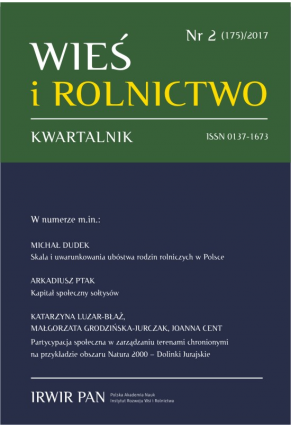Management of State-Owned Agricultural Real Estate and Implementation of the Agricultural System Formation Act
DOI:
https://doi.org/10.53098/wir022017/08Keywords:
land leases and sales, land lease, open public tenders, restricted tenders, functions and tasks of Agricultural Property AgencyAbstract
The Authors attemp to evaluate the Agricultural Property Agency’s (APA) operations to date regarding the implementation of its statutory tasks, disposal of agricultural real estate and the implementation of tasks related with the formation of the agricultural system. From the very beginning of APA’s operation, 3.3 million hectares of land have been permanently allocated, of which 2.7 million hectares through sales, which was the predominant form of the real estate transfer. The infrastructure of the former state-owned farms taken over by the Agency was also subject to privatization. At present, after the legislative amendments (the Act of 2016) long-term lease is the leading form of agricultural land disposal, which enables the land cultivation without engaging funds. Recently, the trend of reducing the area granted for lease has been stopped by leasing available land and limiting the sales of land, the area of which exceeds 2 ha. The following analysis was based on the data included in the APA reports, internal studies and available literature. The results presented prove the Agency’s huge involvement in the process of privatisation of agricultural property. They are also a reflection of other processes which involve stateowned real estate and the private market.
References
Góral J., Kulawik J. (2014). „Kapitalizacja subsydiów w rolnictwie”. Prezentacja na konferencji „Osiągnięcia i wyzwania w gospodarce żywnościowej i na obszarach wiejskich w 10 lata po rozszerzeniu UE”, OSSA Congress k. Rawy Mazowieckiej.
Humięcki W. (2016). Agencja Nieruchomości w rękach rad społecznych. Top Agrar, 7, 26–28.
Kulawik J. (2012). WPR w kontekście globalnym. Nakarmić głodnych. Rolnik Dzierżawca, 1, 178, 48–49.
Podgórski B., Humięcki W. (2016). Kierunki gospodarowania zasobem własności rolnej skarbu państwa. Wieś i Rolnictwo, 3, 172, 163–187. DOI: https://doi.org/10.53098/wir032016/10
Sikorska A., Ciodyk T., Zagórski T., Zadura A., Buks B. (2016). Rynek ziemi rolniczej – stan i perspektywy. Warszawa: Instytut Ekonomiki Rolnictwa i Gospodarki Żywnościowej – Państwowy Instytut Badawczy, Agencja Nieruchomości Rolnych, Ministerstwo Rolnictwa i Rozwoju Wsi.
Raporty z działalności Agencji Nieruchomości Rolnych na Zasobie Własności Rolnej Skarbu Państwa (1994–2016).
Ustawa 2003. Ustawa o kształtowaniu ustroju rolnego z dnia 11 kwietnia 2003 r. (Dz.U. z 2012 r. poz. 803. z poźn. zm.).
Ustawa 2011. Ustawa z dnia 16 września 2011 r. o zmianie ustawy o gospodarowaniu nieruchomościami rolnymi Skarbu Państwa oraz o zmianie niektórych innych ustaw (Dz.U. nr 233, poz. 1382).
Ustawa 2016/1. Ustawa o gospodarowaniu nieruchomościami rolnymi Skarbu Państwa z dnia 19 października 1991 r. (Dz.U. z 2012 r. poz. 1187 z późn. zm.).
Ustawa 2016/2. Ustawa z dnia 11.04.2003 r. o kształtowaniu ustroju rolnego (Dz.U. z 2012 r. poz. 803 ze zmianami wprowadzonymi ustawą z dnia 14.04.2016 r. o wstrzymaniu sprzedaży nieruchomości Zasobu Własności Rolnej Skarbu Państwa oraz o zmianie niektórych ustaw, Dz.U. z 2016 r. poz. 585).
Downloads
Article file downloads
Pages
How to Cite
Issue
Section
License
Copyright (c) 2017 Wieś i Rolnictwo

This work is licensed under a Creative Commons Attribution 4.0 International License.










